Why ‘Dune’ is the sci-fi epic to silence sci-fi skeptics
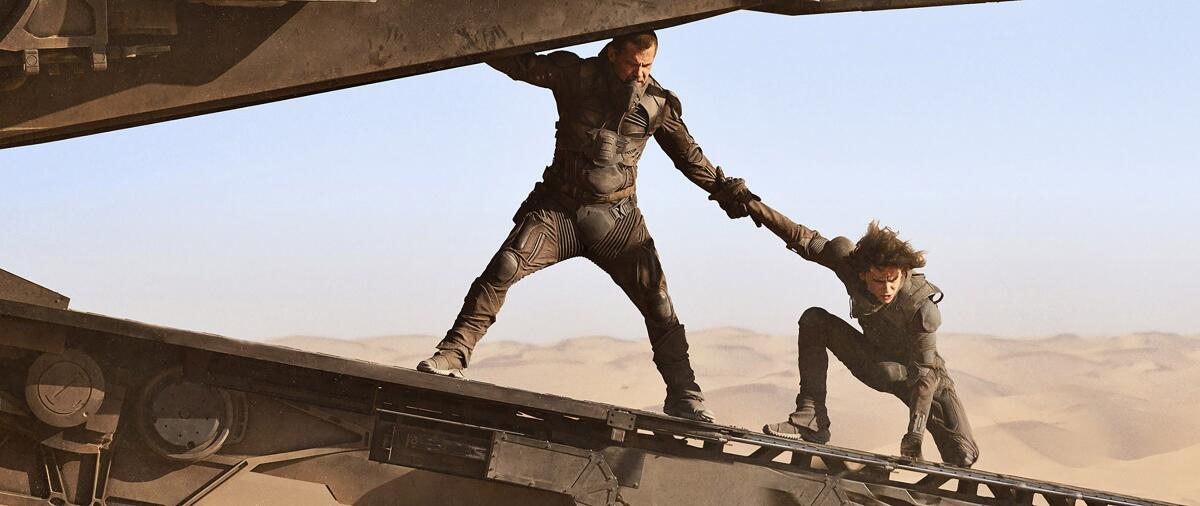
- Share via
Welcome to Screen Gab, the newsletter for everyone who hasn’t already purchased a ticket for “Dune: Part Two.”
As latecomer and Screen Gab editor Matt Brennan writes in this week’s edition, genre skeptics can be reassured that Denis Villeneuve’s sweeping adaptation of Frank Herbert’s classic novel has plenty to offer them — and the first part is streaming if you’re cautious about commitment.
Also this week, Lauren Patten stops by to discuss Hulu murder mystery “Death and Other Details,” plus two new TV series to check out this weekend.
You are reading Screen Gab newsletter
Sign up to get recommendations for the TV shows and streaming movies you can’t miss, plus exclusive interviews with the talent behind your favorite titles, in your inbox every Friday
You may occasionally receive promotional content from the Los Angeles Times.
ICYMI
Must-read stories you might have missed
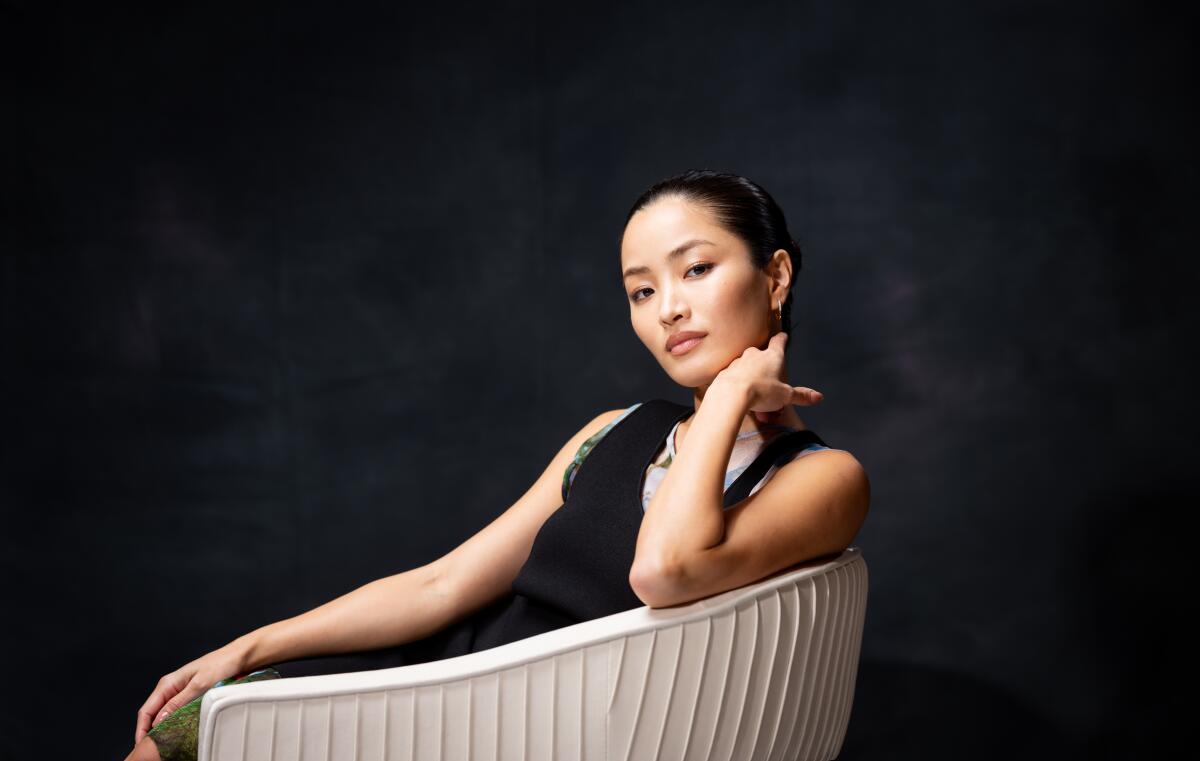
Anna Sawai’s ‘Shogun’ role felt personal: Mariko is ‘every woman in Japan who has suffered’: The actor says she connected deeply with Lady Toda Mariko, her character in FX’s “Shogun,” and that she was encouraged by the creators’ desire to avoid stereotypes of Japanese women.
Scandoval put Ariana Madix center stage. Can she stay there?: The “Vanderpump Rules” star sounds off on Bravo covering for ex Tom Sandoval, critics who say she’s just cashing in and her next chapter: Broadway’s “Chicago.”
For ‘Avatar’s’ Dallas Liu and Paul Sun-Hyung Lee, Zuko and Iroh’s relationship ‘was the most important thing’: The stars of Netflix’s live-action “The Last Airbender” adaptation discuss their characters and the emotional funeral scene that features a familiar tune.
‘Love Is Blind’ illustrates the problems with sex ed and abortion conversations in America: In Season 6 of the Netflix reality show, Johnny McIntyre and Amy Cortés discuss birth control, which stands in contrast to talks contestants have had on abortion.
Turn on
Recommendations from the film and TV experts at The Times
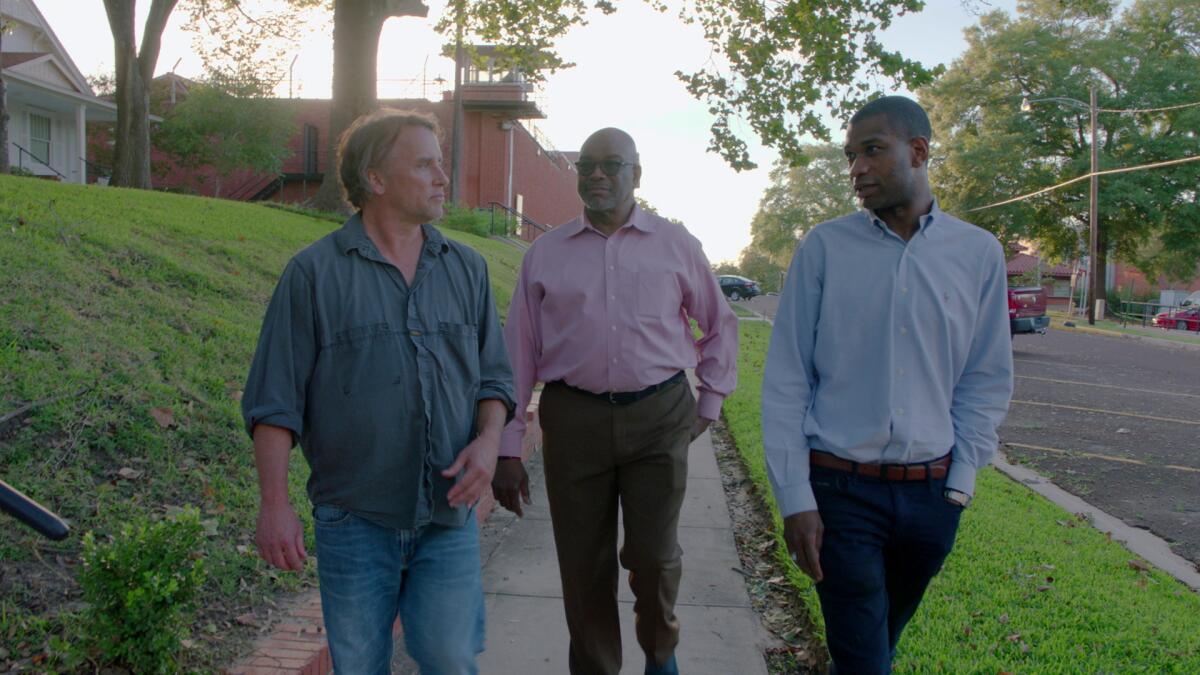
“God Save Texas” (HBO)
As a native Texan, I often gravitate toward programming about my home state, and HBO’s “God Save Texas” is no exception. The three-part docuseries, which premiered at Sundance and is now streaming on Max, takes its name from Lawrence Wright’s fascinating 2018 book that’s part memoir, part Texas history lesson. While Wright appears in the docuseries, he is not the focus, and instead serves as a guide through each of the episodes — subjects include the state’s prison system, oil industry and borderlands. Episodes are told through the lens (and narration) of the directors: Richard Linklater (“Boyhood”), Alex Stapleton (“Reggie”) and Iliana Sosa (“What We Leave Behind”). The themes in the series are likely to resonate with Californians; after all, the two states have lots of parallels — both border Mexico, have coastlines affected by climate change, and non-white majority populations — and they grapple with similar issues highlighted in the episodes. — Maira Garcia
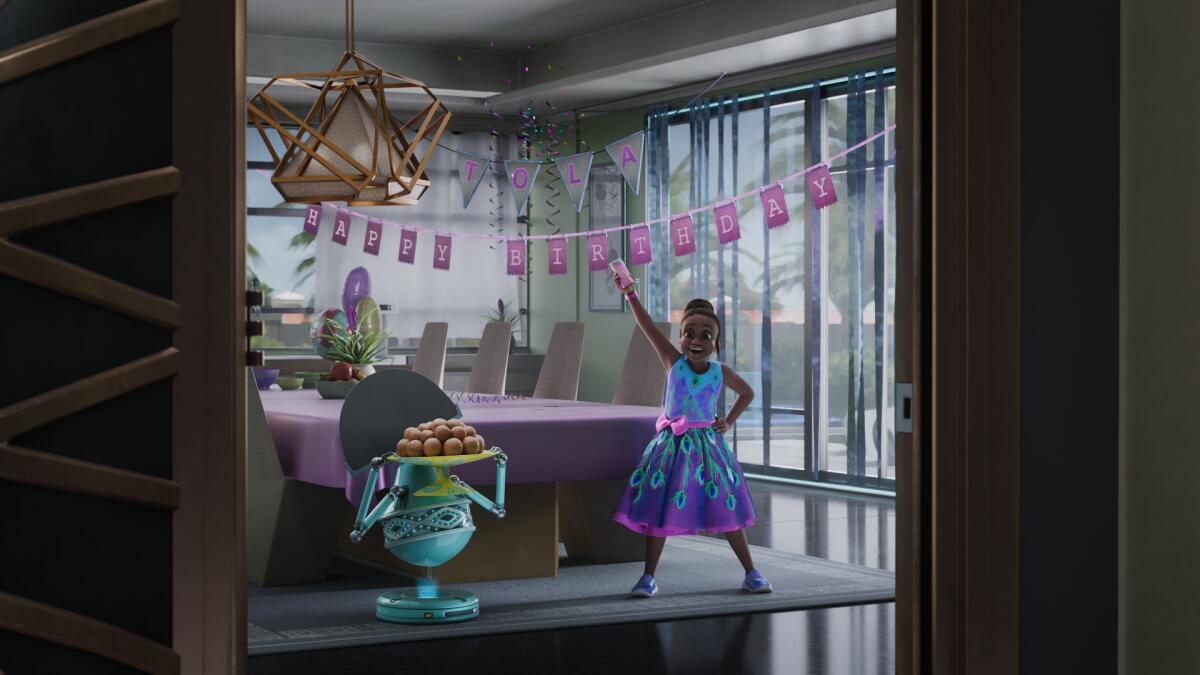
“Iwájú” (Disney+)
Coming-of-age stories and culturally specific sci-fi are a couple of my favorite things and “Iwájú” does both beautifully. A collaboration between Walt Disney Animation and Kugali, an indie Pan-African media company, the six-episode series follows Tola, a spirited 10-year-old who just wants to spend more time with her dad. Living on a wealthy island off the mainland of Lagos, Nigeria, Tola is a bit sheltered but very impulsive and curious. For her birthday, her dad gifts her a pet lizard, which, unbeknownst to her, also happens to be an experimental robotic protector. (I would be a lot less anxious about AI if it was all as adorable as Otin the lizard.) The show touches on issues including income inequality and child kidnappings in an accessible way, but what makes “Iwájú” feel special is the clear care and pride that went into depicting its futuristic Lagos and people. — Tracy Brown
Catch up
Everything you need to know about the film or TV series everyone’s talking about
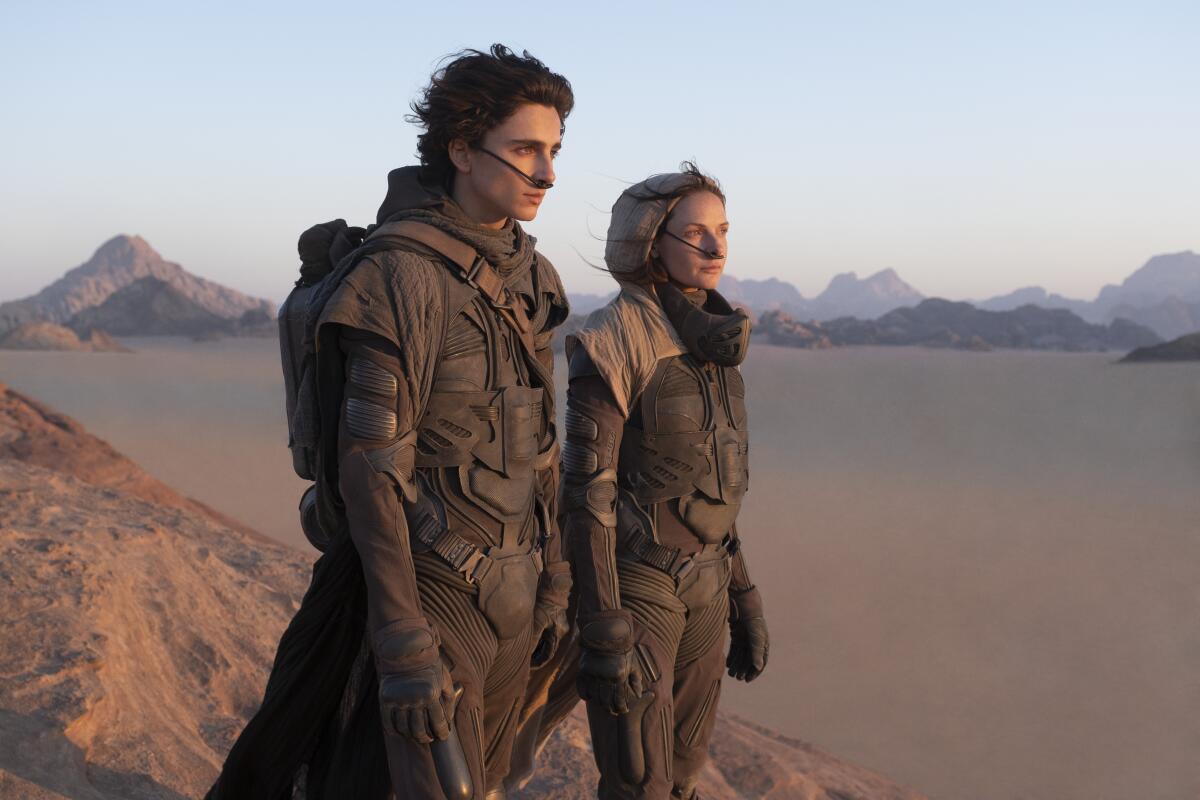
If you’ve made it this far without seeing “Dune” (Max), you likely share the same trepidation over high fantasy and science fiction that I do. After all, such stories are liable to lose their ideal balance of narrative drive, character development and world-building in the translation from page to screen. But fear not: Denis Villeneuve’s adaptation of Frank Herbert’s landmark 1965 novel, the second part of which arrives in theaters this week, reaches into the director’s and the author’s respective arsenals of literary, religious, historical and cinematic allusions to craft a transporting, multi-layered epic.
Indeed, though it bears the unmistakable imprint of films from “Lawrence of Arabia” to “Blade Runner,” Villeneuve’s exacting vision of an interstellar society 20,000 years in the future establishes an internal logic all its own. As Paul Atreides (Timothée Chalamet) watches his father (Oscar Isaac) inherit control of the unforgiving desert planet Arrakis — where the lucrative trade in a hallucinogenic spice called melange has led to the oppression of the native population — the moan of ships blurs into that of sandworms and the dragonfly shape of military “ornithopters” is repeated, in miniature, in the form of deadly “hunter-seekers.” And with local Fremen, reformist House Atreides, rapacious House Harkonnen and the distant Imperium all vying for control, “Dune” offers an allegory for the imposition of and resistance to colonial power as thorny as any portrait of our terrestrial past (or present), where would-be saviors, outright villains and their collaborators profit from the extraction of natural resources at immense human and ecological cost.
Perhaps most compellingly, though, Villeneuve’s film offers the rare onscreen portrait of a mother-son relationship that doesn’t reduce the bond to sentimentality. Rather, the skills Paul learns from his mother Lady Jessica (Rebecca Ferguson), a member of the secretive order of the Bene Gesserit — such as masking his emotions, focusing his mind and using the Voice to compel others’ actions — prove central to the action, and to his survival; if he is to emerge as the prophesied figure known variously as Kwisatz Haderach, Lisan al Gaib or mahdi, it will be down to her influence as much as his father’s.
And if you can’t find a handhold in all of that? Well, “Dune’s” mix of genres may not be the problem. — Matt Brennan
Guest spot
A weekly chat with actors, writers, directors and more about what they’re working on — and what they’re watching
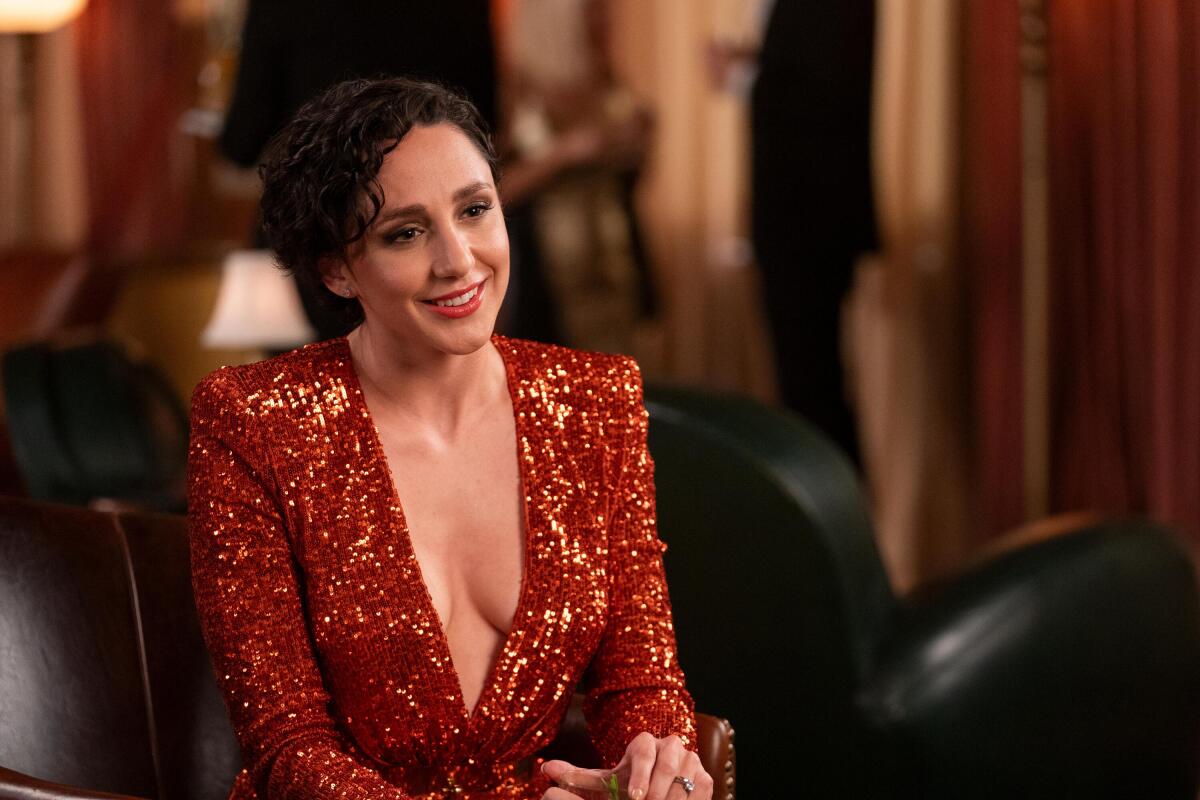
Fans of “The White Lotus,” “Only Murders in the Building” and “Knives Out” will find much to scratch the mystery itch in “Death and Other Details” (Hulu), which stars Mandy Patinkin as “world’s greatest detective” Rufus Cotesworth and Violett Beane as Imogene Scott, the unlikely woman he teams up with when she’s accused of murder. As with those other entries in the genre, of course, the whodunit is only part of the draw: The luxury Mediterranean cruise where the body is discovered doubles as the backdrop for plenty of upstairs/downstairs intrigue, with Lauren Patten’s wealthy heiress, Anna Collier, at the top of the social pecking order. Patten stopped by Screen Gab as the series approaches its finale to talk about Anna’s motives, her own favorite mystery and what she’s watching. — Matt Brennan
What have you watched recently that you are recommending to everyone you know?
I was pretty enthralled with “True Detective: Night Country” [Max]. They had me at Jodie Foster! But really, I was excited to watch something so unapologetically made by and for women. I was looking forward to new episodes every Sunday, which is uncharacteristic for me. I’m usually behind on TV and watch things embarrassingly late.
What is your go-to “comfort watch,” the movie or TV show you go back to again and again?
I don’t know if I’ll ever get tired of watching the original “Jurassic Park” [Netflix]. I think it might be a perfect movie? The iconic T-Rex scene. Laura Dern crying into melting ice cream. Jeff Goldblum in tight pants. It’s one of the only physical DVDs I still hang on to from my teenage years.
“Death and Other Details” offers a classic murder mystery premise: A dead body in a confined setting, and everyone’s a suspect. What’s your favorite entry in the genre, in any medium, and why?
The first season of “Serial.” I got swept up in it — something about the mystery being piped right into your ears made it so intense. I suppose this isn’t really a murder mystery in the classic sense, but I love the intersection of mystery and true crime.
No spoilers about the actual killer, so let me put the big question to you this way: Who does Anna Collier blame for the murder of “Keith Trubitsky”?
Well, I’ll speak about it in broad terms… Anna’s main concern throughout the season has been protecting her family, and her family’s interests. So she’s only invested in Keith’s murder because it threatens her family’s security. She is someone who will lash out and fight anyone and anything that threatens her conception of the Collier family — but, as you’ll see in the finale, that can take her to some very unexpected places.
The complete guide to home viewing
Get Screen Gab for everything about the TV shows and streaming movies everyone’s talking about.
You may occasionally receive promotional content from the Los Angeles Times.



